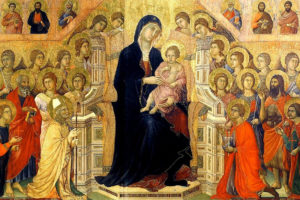Note: If you are new to this series on the two-kingdoms, please take the time to read past articles. It will help you understand the issues at hand and the theological arguments in favor of the two-kingdoms approach.
The church is very busy in this modern day. Busy with activities, busy with ministries, busy with administration. But now the church is busy with something new. The church is now busy “renewing” and “redeeming” the world around us. One more thing to do. And yet this activity of “renewing” and “redeeming” is unlike the other busy activities in that it’s naivete is almost hilarious were it not so theologically troubling. One almost wonders if the return of Jesus is really all that necessary if we ourselves can “redeem” the world around us. I believe that the two-kingdoms doctrine offers this type of thinking a withering critique and this post is written to that end.
Baptized in the Enlightenment-A New Mode of Progress
That old enlightenment myth of human progress just won’t seem to die. But this myth of progress is now taking up a new home. It is not so much in the minds of the anti-God rationalists but rather; this myth has found itself an odd bedfellow in evangelical ministers. And the supposedly conservative, evangelical ministers at that. What is undeniable is this: with each call to renew society, to make Christ lord of all, the church is moving, however unwittingly, on a trajectory toward a rationalistic, anti-supernatural Christianity. Indeed it is on a path that will find it fitting quite nicely with early twentieth century liberalism.
This talk of redemption and renewal inevitably is connected to the idea of progress. And these terms are also inextricably linked to the one-kingdom dogma. The idea of the neo-Kuyperians to renew and redeem culture is nothing more than the old progress myth that has been wrapped in religious jargon to make it carry an air of Christian flavor. Pull back the layers of the onion and the connection is unmistakable, we are talking about the age of Christightenment.
This fusion of enlightenment thought and Christianity has produced some rather ugly children in the past. You would think we learned our lesson a century ago but alas that appears to be doubtful.
The Destruction of Inaugurated Eschatology and the Exclusion of God
Indeed, though many one-kingdom thinkers don’t seem to realize it, their position threatens a core understanding of life in the present age called inaugurated eschatology. For those unfamiliar with the term, inaugurated eschatology means that the end times started with the life of Jesus. Thus we have really have been in the end times for about 2,000 years now. This inaugurated kingdom has an already but not yet reality to it. The Kingdom of God has present and future aspects. What is so important for our discussion is that one-kingdom thinking cuts away at the root of inaugurated eschatology. Indeed with the suggestions that Christians ought to be active in “renewal” and “redemption,” it appears as though we are being propelled forward, unabated, toward realizing the not yet aspects of the kingdom. We are in fact participating in the final redemption. And one can safely expect that the world ought to become more and more heavenly as Christians carry out their call to “renew” and “redeem.”
But what is most troubling about this call from the one-kingdom camp is that God himself becomes increasingly unnecessary in the life of the church. If Christians are the ones bringing about renewal and redemption, who needs God after all? And this is the most grievous error of those championing such cries for renewal and redemption: they take a task that is STRICTLY that of God’s in the pages of scripture and make it the work of man. If the Reformation taught us one thing it should have been that all true spiritual reform comes about by the work of God, not the work of man. In this way, one-kingdom thinkers are nothing more than a form of post-medieval Catholicism.
The trajectory of one kingdom thinking is not good. It is not just possible but in my estimation probable, that this theological camp is currently sowing the seeds for some sort of evangelical neo-Catholic liberalism that will likely take a few generations to germinate. It is a most bizarre cocktail of genuine Christianity, the myth of progress and emphasis on the work of man. If history responds in typical fashion, one could expect to find the genuine Christianity stripped out within a few short decades, leaving nothing but more dead denominations in its wake, just like what happened to mainline churches in the early part of the twentieth century.
The Two Kingdoms Alternative
Standing in contrast to this theology and this mode of doing church is the two-kingdoms doctrine. On each point articulated above, the two-kingdoms doctrine offers a different viewpoint.
Two-kingdoms theology believes in progress but it is a God induced progress. It is a progress that is brought about through the death and resurrection of his son and the final consummation. Indeed, this progress comes about from the Lord of History, not from the work of his children. And this progress really is redemptive. The language which one-kingdom thinkers use (read: renewal and redemption), cheapens the biblical weight and value of those words. Who can redeem and renew but God himself? In Romans 8:22-25 we read of God’s renewal of all things:
For we know that the whole creation has been groaning together in the pains of childbirth until now. And not only the creation, but we ourselves, who have the firstfruits of the Spirit, groan inwardly as we wait eagerly for adoption as sons, the redemption of our bodies. For in this hope we were saved. Now hope that is seen is not hope. For who hopes for what he sees? But if we hope for what we do not see, we wait for it with patience.
Notice that our hope lies in waiting, not bringing about. The foundation of hope for renewal is stripped away if we are the ones to accomplish it. I can hope because it is Him who brings it about. When one-kingdom thinkers talk of renewal and redemption, it has a distinctly modern flavor. The idea of redemption and renewal in the text of scripture invokes the idea of something super-natural, something we could never achieve.
In sum, the two-kingdoms doctrine teaches me to hope in God’s work for God’s definition of redemption rather than in my work for some sort of cheapened definition redemption.
Conclusion
I believe the one-kingdom v. two-kingdom debate is a quite serious one that will have far reaching implications for the church’s ability to be faithful to the gospel message through the next century. It is not simply an applicational nuance or a matter of hair splitting but embedded deeply in the ideas of each camp, is a perception of the gospel message and its calling. As such it is crucial that the spotlight continues to shine on this discussion in various Christian circles.





3 Comments
Leave your reply.